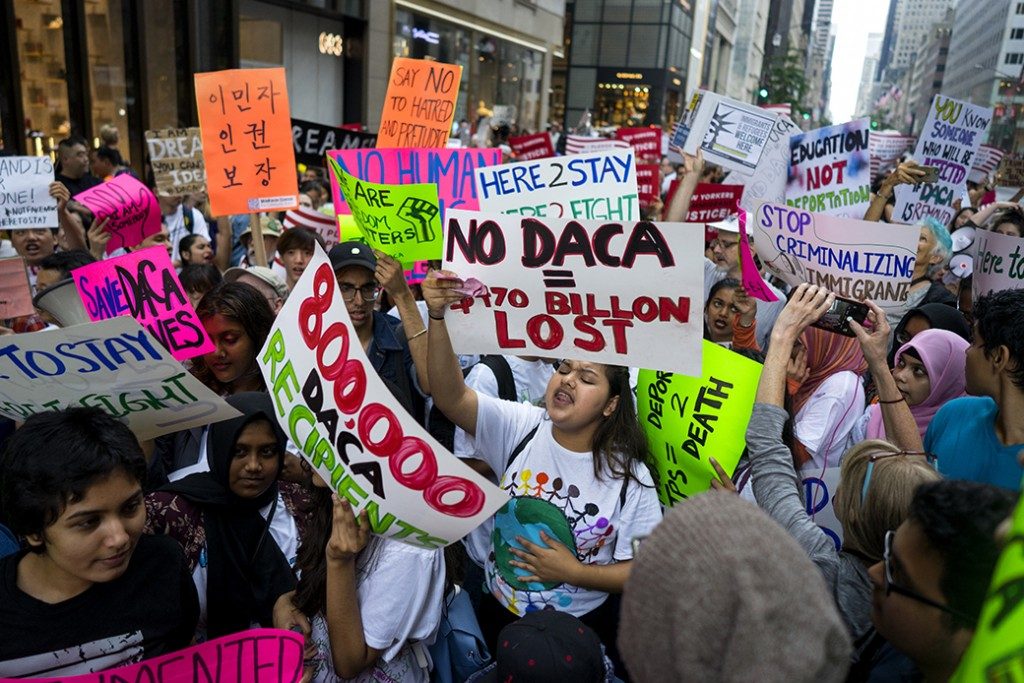What ‘DREAMERS’ Need to Know After DACA Ends

Activists supporting DACA. Photo from Center for American Progress.
Through an early morning tweet on September 5, President Donald Trump signaled what the government dubbed as an “orderly phasing out” of the Deferred Action for Childhood Arrivals (DACA) that was signed by his predecessor Barack Obama.
Due to this development, the DHS immediately announced that it “will provide a limited, six-month window during which it will consider certain requests for DACA and applications for work authorization, under specific parameters.” New DACA and Employment Authorization applications are no longer accepted. However, DACA applications that were received by the USCIS on or before Sept. 5, 2017 will continue to be processed.
Those currently given two-year work permits will still be able to continue working until their permit expires. Those whose permit will expire on March 5, 2018 will be allowed to apply for two-year renewal as long as they apply by Oct. 5, 2017. In addition, DHS will not approve any new Form I-131 applications for advance parole associated with the DACA program, although it will generally honor previously approved applications until its stated validity period. DHS will also administratively close all pending Form I-131 applications for advance parole filed under the DACA program, and will refund all associated fees.
Those affected by the announcement should consult with an attorney. Unexpired DACA and work permits can still be terminated if DHS believes that the recipient is no longer eligible or for any other reasons. ‘Dreamers’ should talk with their attorney if they have other options. Members of the American Immigration Lawyers Association (AILA) have reported that up to 30% of potential DACA applications are eligible for something better.
The government says the “phasing out” is a humane way of handling the issue given that Pres. Trump has repeatedly mentioned he will show “great heart” in dealing with the “dreamers”.
Pres. Obama instituted DACA on June 15, 2012. Under this program, those under 31 years old on June 15, 2012, arrived in the US before becoming 16, had continuously resided since June 15, 2007, were either in school, had graduated or completed high school or a general education development (GED) certificate, or were honorably discharged veterans of the US Coast Guard or US Armed Forces and had not been convicted of a felony, could have deferred action or deferred deportation. This protected nearly 800,000 undocumented minor immigrants from deportation. To date, 787,580 have been allowed to stay here in the US, granted work permits and allowed to obtain education.
Obama later expanded DACA and created DAPA (Deferred Action for Parents of Americans and Lawful Permanent Residents) which among other things expanded the coverage of the DACA to include a wider range of ages and arrival dates. This became the subject of a lawsuit filed by 26 states that resulted in a preliminary injunction ordered by a US District Court in Texas that stopped the implementation of the expanded DACA and DAPA nationwide. This later reached the Supreme Court and ended in a divided vote, effectively upholding the preliminary injunction ordered by the lower court.
Meanwhile, Texas and several other states have been putting pressure on Trump to fulfill his campaign promise to scrap DACA. On June 29, 2017, attorneys general of Alabama, Arkansas, Idaho, Kansas, Louisiana, Nebraska, South Carolina, and West Virginia sent a letter to US Attorney General Jeff Sessions asserting that this policy is an unlawful exercise of executive authority. These states threatened to sue the administration and amend the DAPA lawsuit to include a challenge to DACA.
Trump has been threading these waters very lightly but eventually decided to give the ball to Congress to enact a legislative solution to this issue and urged them to “do your job” as he puts it in his tweet.
Immigrants’ rights groups are enraged and several “dreamers” also fear mass deportation given that the DHS has all their information. Several lawmakers, both from the Republican and the Democrat now call on their colleagues in Congress to protect the “dreamers”. In a statement, House Speaker Paul Ryan (R-WI) said that “however well-intentioned, President Obama’s DACA was a clear abuse of executive authority, an attempt to create law out of thin air. This was never a viable long-term solution. Congress writes laws, not the president… “He then hoped that Congress would come out with an immigration policy that will protect these children. Senator Dianne Feinstein (D-CA) and Representative Ileana Ros-Lehtinen (R-FL) also called on Congress to protect DACA recipients by voting on the bipartisan DREAM Act “as soon as possible.”
